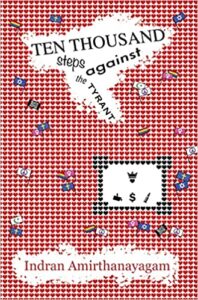
978-1937968984
2022, Broadstone Books
$19.95
100 pages, paper
(sponsored link)
Reviewed by Susana H. Case
The tyrant in Amirthanayagam’s book is Donald Trump, a break from his writing about Sri Lankan dictators, and the poet’s voice is that of the migrant watching what he calls “(The Mother of )…Elections” as well as of pandemics. “Get rid of the dissembler, hoodlum and pussy-grabber. Get rid of the thou shalt not enter and the latrine supervisor. Get rid of the one who would be king. Get rid of the golden tamarind toupee,” he writes (one of the clever repetitions of the book) in “The Relevance of Allen Ginsberg.” And we did, at least for now.
But what a year that was! “I am lucky to have lived, and to have loved, and all that jazz,” he writes in “The Lesson.” These are poems of hope in the face of outrageous acts and happenings. “…we have to get back on the road to the promised land.” As Amirthanayagam, a distant cousin of Kamala Harris, reminds us in “The Right Path,” the work is not yet done, voting an important part of this work, as is poetry.
These poems make explicit within a free verse, rhythmic structure, what is a continuing theme in Amirthanayagam’s work, no matter the ostensible subject matter. “All events are political,” he maintains in “On Denial of Listing the Poets’ Political Fundraiser.” When he visits his brother every Sunday, what he notices is the food line, in this prose poem, “In Love And Politics”:
Every Sunday when I go to see my brother I pass a line of cars a few miles long outside a church on Randolph Road. The drivers wish to satisfy hunger waiting for them at their homes in this time of virus, lost jobs, not enough money to pay mortgage or rent. I have read about soup kitchens, the Great Depression, dust, scrabble, have seen Henry Fonda play Joad in The Grapes of Wrath. But to see ordinary people, hungry now, in automobiles?
Though most of the book concerns the American presidency and vice-presidency, there are references to Black Lives Matter, and a second, smaller section of poems centered on the pandemic. Here too, a tendency to despair manifest in some poems (“the island / no longer belongs to me, / and my waist will never deflate, / the hair on my head not return,” (“Fear,” p. 74)) still takes a back seat, as in “Notes for the Days After”):
…after the war
has ended, after we have put this quarantine into a back
pocket in our collective mind, we will venture out again
into the forever-changed world to see who is moving
about, who has come out of the dark night, alive.
Still, Amirthanayagam is no foolish Pollyanna in his hopefulness for a better world. I was startled to see some of that anger addressed to a xenophobic responder on social media to one of my own poems, written during the pandemic, about workers coming to remodel my bathroom, “Sheltering in Place with Your Poem, Susana Case” in which he writes, sarcastically: “How / will I, or you, dear poet—who wrote the original Sheltering— / change even one bigot let alone a few million, and they are / scattered throughout the globe.” How indeed? Not by being quiet. And not by ignoring the needs of our fellow human beings.
Published in Cider Press Review, Volume 24, Issue 1.
See all items about Susana H. Case
Visit Susana H. Case’s contributors page.
See all items about Indran Amirthanayagam
Visit Indran Amirthanayagam’s contributors page.


 Susana H. Case is the author of seven books of poetry, most recently Dead Shark on the N Train, from Broadstone Books, 2020, which won a Pinnacle Book Award for Best Poetry Book and a NYC Big Book Award Distinguished Favorite. She is also the author of five chapbooks. Her first collection, The Scottish Café, from Slapering Hol Press, was re-released in a dual-language English-Polish version, Kawiarnia Szkocka by Opole University Press. Case is a Professor and Program Coordinator at the New York Institute of Technology in New York City and can be reached at
Susana H. Case is the author of seven books of poetry, most recently Dead Shark on the N Train, from Broadstone Books, 2020, which won a Pinnacle Book Award for Best Poetry Book and a NYC Big Book Award Distinguished Favorite. She is also the author of five chapbooks. Her first collection, The Scottish Café, from Slapering Hol Press, was re-released in a dual-language English-Polish version, Kawiarnia Szkocka by Opole University Press. Case is a Professor and Program Coordinator at the New York Institute of Technology in New York City and can be reached at  Indran Amirthanayagam writes in English, Spanish, French, Portuguese, and Haitian Creole. He has published over twenty books of poetry, including Blue Window (translated by Jennifer Rathbun), The Migrant States, Coconuts on Mars, The Elephants of Reckoning (winner 1994 Paterson Poetry Prize), Uncivil War, and The Splintered Face: Tsunami Poems. In music, he recorded Rankont Dout. He edits the Beltway Poetry Quarterly; curates www.ablucionistas.com; co-directs Poets & Writers Studio International; writes a weekly poem for Haiti en Marche and El Acento; and hosts The Poetry Channel. He has received fellowships from the Foundation for the Contemporary Arts, the New York Foundation for the Arts, The US/Mexico Fund for Culture, and the Macdowell Colony. He is a 2021 Emergent Seed grant winner.
Indran Amirthanayagam writes in English, Spanish, French, Portuguese, and Haitian Creole. He has published over twenty books of poetry, including Blue Window (translated by Jennifer Rathbun), The Migrant States, Coconuts on Mars, The Elephants of Reckoning (winner 1994 Paterson Poetry Prize), Uncivil War, and The Splintered Face: Tsunami Poems. In music, he recorded Rankont Dout. He edits the Beltway Poetry Quarterly; curates www.ablucionistas.com; co-directs Poets & Writers Studio International; writes a weekly poem for Haiti en Marche and El Acento; and hosts The Poetry Channel. He has received fellowships from the Foundation for the Contemporary Arts, the New York Foundation for the Arts, The US/Mexico Fund for Culture, and the Macdowell Colony. He is a 2021 Emergent Seed grant winner.


